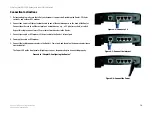
5
Chapter 2: Your Virtual Private Network (VPN)
What is a Virtual Private Network?
EtherFast Cable/DSL VPN Router with 4-Port 10/100 Switch
data to a new destination. Even though the data is not received by its intended recipient, it appears that way to
the person sending the data.
These are only a few of the methods hackers use and they are always developing more. Without the security of
your VPN, your data is constantly open to such attacks as it travels over the Internet. Data travelling over the
Internet will often pass through many different servers around the world before reaching its final destination.
That's a long way to go for unsecured data and this is when a VPN serves its purpose.
What is a Virtual Private Network?
A VPN, or Virtual Private Network, is a connection between two endpoints - a VPN Router, for instance - in
different networks that allows private data to be sent securely over a shared or public network, such as the
Internet. This establishes a private network that can send data securely between these two locations or
networks.
This is done by creating a "tunnel". A VPN tunnel connects the two PCs or networks and allows data to be
transmitted over the Internet as if it were still within those networks. Not a literal tunnel, it is a connection
secured by encrypting the data sent between the two networks.
VPN was created as a cost-effective alternative to using a private, dedicated, leased line for a private network.
Using industry standard encryption and authentication techniques - IPSec, short for IP Security - the VPN creates
a secure connection that, in effect, operates as if you were directly connected to your local network. Virtual
Private Networking can be used to create secure networks linking a central office with branch offices,
telecommuters, and/or professionals on the road (travelers can connect to a VPN Router using any computer with
VPN client software that supports IPSec, such as SSH Sentinel.)
There are two basic ways to create a VPN connection:
•VPN Router to VPN Router
•Computer (using VPN client software that supports IPSec) to VPN Router
The VPN Router creates a “tunnel” or channel between two endpoints, so that data transmissions between them
are secure. A computer with VPN client software that supports IPSec can be one of the two endpoints. Any
computer with the built-in IPSec Security Manager (Windows 2000 and XP) allows the VPN Router to create a VPN
tunnel using IPSec (refer to “Appendix F: Configuring IPSec between a Windows 2000 or XP PC and the VPN
Router”). Other versions of Microsoft operating systems require additional, third-party VPN client software
applications that support IPSec to be installed.
encryption
: encoding data transmitted in a network
IP (I
nternet
P
rotocol): a protocol used to send data
over a network
software
: instructions for the computer












































